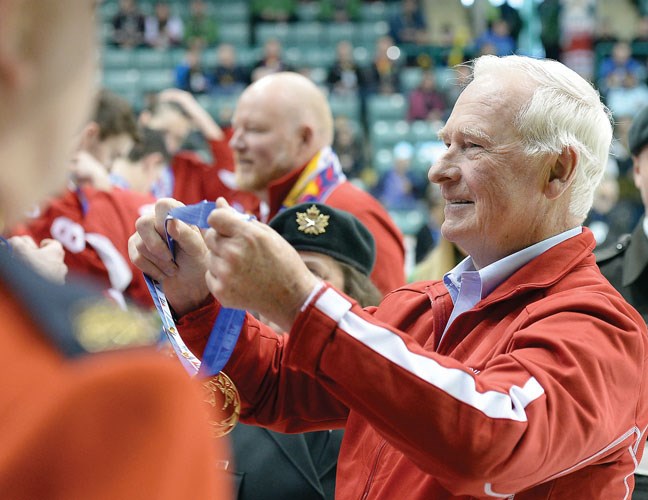Universities belong to their communities and communities belong to their universities. One cannot exist without the other.
That was the message shared Monday morning by Canada's governor general David Johnson and echoed by his co-panelists Mayor Lyn Hall and UNBC President Daniel Weeks.
"They really draw from this notion of intensive collaboration," said Johnston, who was in Prince George to officially close the Canada Winter Games on Sunday, and spoke at the Prince George Playhouse Monday before heading to Haida Gwaii.
Johnston kicked off with a presentation heavy with examples of strong partnerships during his time as president at the University of Waterloo, an institution that grew from a class of 74 students in 1957 to more than 35,000 students today.
"It's finding the commonality of interests," he said. "It's a lot of different dots you have to follow," while also being flexible, having a clear strategy and maintaining good governance.
"We have to have funding that encourages diversity," he said, adding a school's success is more than student growth and should focus on quality of programs. "Don't get mesmerized by any particular formula."
Weeks called student population as a sign of success an "arbitrary measure."
"Growth can mean much, much more than student numbers."
Johnston pointed to parallels between UNBC and Waterloo in that both are unconventional, based in cities with a similar population, draw on local connections and are relatively new institutions (while UNBC celebrates its 25th anniversary this year, Waterloo will celebrate its 50th anniversary in 2015).
Waterloo set itself apart by creating exceptional programs and strong co-op opportunities for its students. Johnston also noted it had a unique approach to its intellectual property policy for students and professors.
"It's owned by them," he said, in stark comparison to the overwhelming majority of North American institutions that either own the information outright or strike a sharing relationship.
"The theory was that universities are not very good at commercialization nor should they try to commercialize but they should try very hard to create an ecosystem where commercialization can occur very readily."
Weeks thanked Johnston for his words of experience at Waterloo.
"They do resonate," Weeks said. "One of the things that strikes me is that if you look historically, the things that made us great, that made Prince George a place to be 100 years ago are no different today.
"It's strategic location in the north is still the same today. Our location drives that opportunity," said Weeks, but emphasized the need for developing leadership locally.
Hall said the city is striving to connect with major institutions in the city, including the airport, the university hospital and more.
"Prosperity in a community needs to be viewed from what we offer in the community," he said. "It is about meeting the needs of the community, and in this case it's about meeting the needs of the region."
At the end, moderator Tracy Summerville asked the panelists to highlight the next steps for Prince George as a university community.
Each highlighted improving opportunities and partnerships with First Nations communities, but Johnston was most outspoken about the education disadvantages aboriginal people face.
"We've got some big holes and one is aboriginal, First Nations education, a problem that has gone on far, far, far too long and it's time to change that," said Johnston after referencing an international survey that found the bottom 20 per cent of Canadians have low upwards mobility when it comes to education.
Weeks said he's looking forward to planning a joint trip with the city with officials in Victoria. He also told the audience to watch for new initiatives from student leaders, something he highlighted throughout the talk as necessary for growth in the north.
Hall pointed to two new council advisory committees - one for education, one for students - that he said would help inform city decisions.
"How do we draw students into our downtown," said Hall, noting that housing, transportation and cultural opportunities are all major draws for students. "What we strive to do as a city, we need to connect the university to our journey as well. We are a university city."



